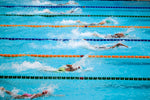
Creatine Monohydrate for Swimmers: Exploring Its Impact on Strength and Performance in Aquatic Sports
, by Sandesh Prasannakumar, 7 min reading time
New Year Sale Is Live - Shop Now!
New Year Sale Is Live - Shop Now!
New Year Sale Is Live - Shop Now!
New Year Sale Is Live - Shop Now!
New Year Sale Is Live - Shop Now!
New Year Sale Is Live - Shop Now!
New Year Sale Is Live - Shop Now!
New Year Sale Is Live - Shop Now!
New Year Sale Is Live - Shop Now!
New Year Sale Is Live - Shop Now!

, by Sandesh Prasannakumar, 7 min reading time
Creatine monohydrate, a popular supplement among athletes, has garnered significant attention in the realm of swimming. Its potential to enhance strength, power, and overall performance makes it interesting for swimmers and coaches. This article delves into the science behind creatine monohydrate, its benefits for swimmers, and how it can be effectively incorporated into a swimmer's training regimen.
Creatine is a naturally occurring compound found in small amounts in certain foods and synthesised in the human body from amino acids. Creatine monohydrate is a supplement form that has been extensively researched and proven to increase muscle creatine stores. This compound plays a crucial role in producing adenosine triphosphate (ATP), the primary energy currency of cells, particularly during short bursts of high-intensity activity.
Creatine monohydrate increases the availability of creatine phosphate in muscles, which is then used to rapidly regenerate ATP during high-intensity activities. For swimmers, this means enhanced performance in short, explosive movements, such as starts, turns, and sprints. The increased ATP availability allows for greater power output and reduced fatigue, thereby improving overall swim performance.
One of the most significant benefits of creatine monohydrate for swimmers is increased muscle strength and power. Studies have shown that creatine supplementation can lead to significant gains in both parameters, which are crucial for explosive swimming movements.
Swimmers often need to execute powerful sprints during races. Creatine monohydrate has been shown to improve sprint performance by providing the necessary energy for short, high-intensity efforts. This can be particularly beneficial during the start of a race or when executing a fast turn.
Creatine supplementation helps delay the onset of fatigue during high-intensity workouts. By maintaining higher energy levels, swimmers can sustain their performance for longer periods, leading to more effective training sessions and better overall endurance.
Creatine monohydrate aids in faster recovery between training sessions. Enhanced recovery allows swimmers to train harder and more frequently, improving performance over time.
Although not always a primary goal for swimmers, the increase in muscle mass associated with creatine supplementation can contribute to greater overall strength and power, which are beneficial for performance in the water.
Research on the impact of creatine monohydrate on swimming performance has yielded promising results. A study published in the Journal of Strength and Conditioning Research found that swimmers who were supplemented with creatine significantly improved sprint performance and overall swim times compared to those who did not.
Another study in the International Journal of Sports Medicine demonstrated that creatine supplementation enhanced the recovery rate of muscle strength after high-intensity swim training, allowing swimmers to maintain higher performance levels across multiple training sessions.
To maximise muscle creatine stores quickly, a loading phase is recommended. This typically involves taking 20 grams of creatine monohydrate daily, divided into four 5-gram doses, for 5-7 days.
After the loading phase, a maintenance dose of 3-5 grams per day is sufficient to maintain elevated creatine levels in the muscles. It is generally advised to take creatine with a carbohydrate source to enhance its absorption.
While the timing of creatine intake is not as critical as the total daily dose, taking creatine post-workout with a meal may enhance its uptake and utilisation by the muscles.
Adequate hydration is essential when supplementing with creatine, as it can cause an increase in water retention within the muscles. Swimmers should ensure they are drinking enough fluids to stay hydrated.
Creatine monohydrate is generally considered safe when used as directed. However, some individuals may experience minor side effects such as gastrointestinal discomfort, muscle cramping, or increased water retention. It is important to start with the recommended doses and consult with a healthcare professional if any adverse effects are observed.
Creatine monohydrate can be a valuable supplement for swimmers looking to enhance their strength, power, and overall performance in the water. By improving sprint performance, reducing fatigue, and aiding in faster recovery, creatine can contribute to more effective training and better race outcomes. Swimmers should consider incorporating creatine monohydrate into their regimen under the guidance of a coach or healthcare professional to maximise its benefits safely.
For all your protein and supplement needs, visit Genetic Nutrition!
Yes, creatine monohydrate is generally safe for swimmers when used as directed. It is one of the most researched sports supplements and has a well-established safety profile. However, swimmers should consult with a healthcare professional before starting any new supplement.
The effects of creatine monohydrate can be noticed within a week when following the loading phase. During the maintenance phase, continued benefits can be observed with consistent use. Individual responses may vary, but most athletes report improvements in strength and performance within a few weeks.
Creatine monohydrate can increase water retention within the muscles, so it is important to maintain adequate hydration levels. Swimmers should drink plenty of fluids to stay hydrated and prevent any potential dehydration-related issues.
Creatine monohydrate can contribute to increased muscle mass, primarily due to increased water retention within the muscles and enhanced strength gains. While this can benefit overall performance, swimmers should balance their training to ensure they maintain an optimal body composition for their specific events.